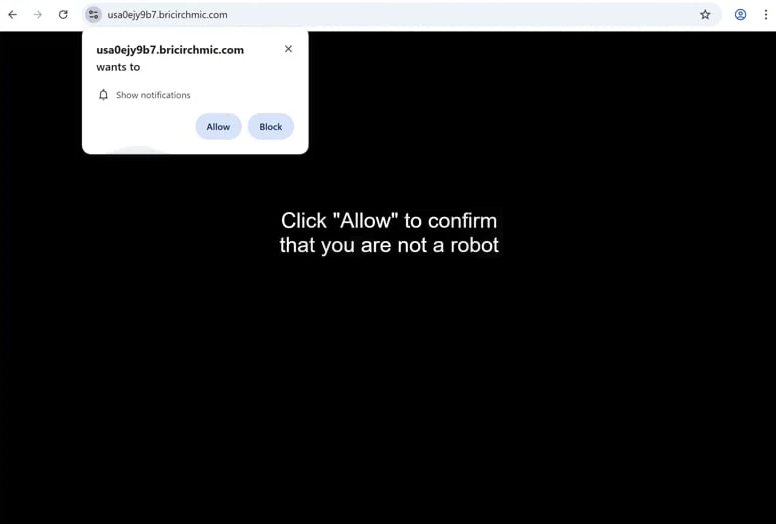Remove bricirchmic.com pop-ups
bricirchmic.com is one of thousands of generic sites whose sole purpose is to trick users into allowing desktop ads. Users who get redirected to the site will get a pop-up saying “bricirchmic.com wants to show notifications”, and because this is a legitimate feature, clicking “Allow” will result in ads on your desktop. These ads could also expose you to potentially dangerous content, including malware and various scams. Fortunately, revoking a site’s permission to show notifications is easy, and instructions are provided at the end of the report.
Some sites, like bricirchmic.com, should not be given permission to show notifications because they misuse this feature to bombard users with ads. Upon entering the site, you’ll see a prompt asking you to allow notifications. Despite the site making it seem like it has content on it, it’s completely empty. If you grant it permission, expect to see advertisements on your desktop. Interacting with these ads is risky, as they may lead to scams and malware. They could also be designed to imitate legitimate system notifications, making it easy to confuse them. It’s best to revoke notification permissions for these kinds of sites as soon as possible.
To identify the cause of any unwanted redirects to sites like bricirchmic.com, we suggest scanning your computer with WiperSoft anti-virus program. If any adware is found, be sure to remove it to stop these redirects. If nothing is detected, consider installing an ad blocker to prevent pop-ups and redirects when visiting potentially risky websites.
Random redirects can be a sign of adware
If you’re often finding yourself redirected to random websites, it might indicate that your computer has adware. However, these redirects are more likely to occur due to visiting high-risk sites. Websites that host explicit or pirated content commonly spam potentially harmful ads and trigger unwanted redirects. An easy way to address this problem is to install ad blocker to block all intrusive ads and redirects.
If you experience frequent redirects, there’s a chance your computer has adware. While it’s not as severe as other malware types, it can still be quite annoying since it exposes you to unwanted advertising content. Adware and similar infections (like browser hijackers or potentially unwanted programs) often come bundled with free programs as extra offers. These extra offers can be installed alongside the main program without your explicit consent, a practice known as software bundling. This method is often criticized because it allows unwanted programs to sneak into users’ systems without their knowledge.
While these bundled offers are technically optional, you must manually deselect them to stop their installation. To do this, you need to make them visible during the installation process. What you need to do is opt for Advanced or Custom settings when installing free programs. This will reveal the offers, enabling you to deselect any that you do not want. Regardless of how useful an offer may seem, avoid allowing it to install—legitimate programs should not use sneaky methods like software bundling. If you permit these installations, your computer may soon be cluttered with unwanted programs that can be difficult to remove later on.
Remove bricirchmic.com ads
If you frequently find yourself redirected to random websites, it’s a good idea to run a scan on your computer using anti-virus software like WiperSoft, as this may indicate the presence of adware. If the scan identifies any adware, removing it should eliminate the redirects. On the other hand, if adware isn’t the issue, the websites you’re visiting might be the trigger. To prevent intrusive ads and redirects while navigating high-risk sites, install an ad blocker.
If bricirchmic.com has permission to show you notifications, it’s advisable to revoke that permission as soon as possible. This process is straightforward; just go to your browser settings and remove bricirchmic.com from the list of authorized sites. Once you do this, you should stop receiving those desktop ads. Additionally, it’s wise to remove any other suspicious websites from this list.
- For Mozilla Firefox: Open menu (the three bars top-right corner) -> Options -> Privacy & Security. Scroll down to Permissions, press on Settings next to Notifications, and remove bricirchmic.com and any other questionable website. You can permanently turn off these notification requests by checking the “Block new requests asking to allow notifications” box in the same Notifications settings.
- For Google Chrome: Open menu (the three dots top-right corner) -> Settings -> Privacy and security -> Site Settings. Click on Notifications under Permissions, and remove bricirchmic.com and any other questionable website. You can stop these notification requests permanently by toggling off “Sites can ask to send notifications”.
- For Microsoft Edge: Open menu (the three dots top-right corner) -> Settings -> Cookies and site permissions -> Notifications. Review which sites have permission and remove bricirchmic.com and any other questionable website. You can permanently turn off these notification requests by toggling off “Ask before sending”.
Site Disclaimer
WiperSoft.com is not sponsored, affiliated, linked to or owned by malware developers or distributors that are referred to in this article. The article does NOT endorse or promote malicious programs. The intention behind it is to present useful information that will help users to detect and eliminate malware from their computer by using WiperSoft and/or the manual removal guide.
The article should only be used for educational purposes. If you follow the instructions provided in the article, you agree to be bound by this disclaimer. We do not guarantee that the article will aid you in completely removing the malware from your PC. Malicious programs are constantly developing, which is why it is not always easy or possible to clean the computer by using only the manual removal guide.

